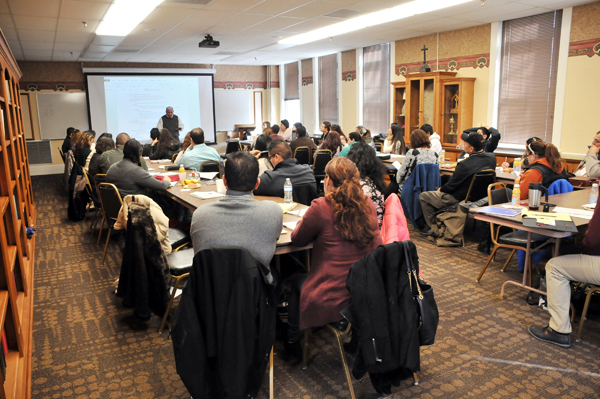By Dan Ebener
For The Catholic Messenger
(Editor’s Note: This is the 10th and final article in a series by Dan Ebener on leadership in the Catholic Church. The articles feature excerpts from his latest book on leadership, to be published this fall.)
This is the cycle of Christian life and liturgy: At the beginning of the liturgy, we are welcomed as disciples, members and stewards. By the end, we are invited to go out as apostles, leaders and evangelists to love, serve and change the world. The Mass calls us to leadership.

Miguel Moreno, diocesan coordinator of Multicultural Ministry, talks during a Spanish Ministry Formation Program workshop last year at St. Vincent Center in Davenport.
As Sherry Weddell points out, the charism of pastoring is not limited to those who are canonical pastors. You must be ordained to be the canonical pastor. To be a pastoral leader, you just need to find your burn. Discover your passion. Connect your passion to your parish mission: How can you enable more people to encounter Christ in their lives?
Open your heart, your mind and your will to receive guidance from the Holy Spirit. Discern the direction that God is calling you to personally. Enter into a dialogue with other members of your parish to discern where God is calling you collectively. Align your will with God’s will for you and your parish.
At some point, you will discover that the change you want to see is too big for one person to lead. You will find that what you really need is not more followers but more leaders. When you come to this realization, the next step in practicing leadership is to develop the leadership capacity of others.
The structure and the culture of the parish can encourage or discourage lay engagement, active participation and especially the development of leadership. Pope Francis has indicated that structural and cultural change is a priority for the church. He has called for less authoritarianism and more lay participation in decision-making, less bureaucracy and more dialogue about organizational structures, less secrecy and more transparency in the business dealings of the church.
If we want new leaders to emerge, we need to “ask” more and “tell” less. Asking questions can nurture a culture where everyone is on a search for a higher level of truth. It encourages those who have something to contribute but have never been asked. If we want to get the best version of the other people around us, we will find that it is much wiser to ask and listen rather than to tell and supervise.
Jesus was famous for asking questions. According to Martin Copenhaver, Jesus asks 308 questions in the four Gospels. He asks: “Who do you say that I am?” (Matt 16:15); “What do you want me to do for you?” (Mark 10:51); “Do you love me?” (John 21:17); and “What are you looking for?” (John 1:38). Jesus asks questions to inspire, clarify, persuade, confront, confuse and disarm. He challenges the notion that leaders must have all the answers.
To lead with questions requires: a.) the wisdom to know what we don’t know, b.) the humility to admit that to others and c.) the courage to act accordingly.
Once you have asked a good question, it is time to listen. Listening is opening oneself up to be influenced by others. By listening, we show interest in the ideas of others. We allow others to lead.











